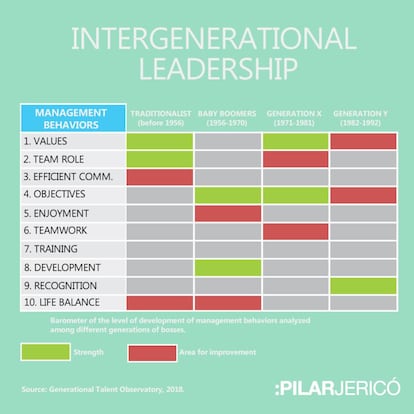Tell me your age and I’ll tell you what kind of boss you are
Leaders today need to be aware of inter-generational differences if they want to improve workplace performance

Every generation has a different style of leadership – that’s the conclusion from a new report by the Generational Talent Observatory and the European University of Madrid. Everyone is different, we know this, but it is important to also recognize how our social circumstances influence the way we understand power, hierarchy, personal relationships, and, of course, people management.
Baby Boomers led social change in Spain and now occupy senior work positions
The report is not just aimed at classifying these differences but also at highlighting what each generation has to offer. So, keeping in mind these are broad categories, let’s take a look at what the report found to be the leadership styles of each generation.
Traditional Generation (people born before 1955)
They lived under Francisco Franco’s dictatorship and pushed for democracy in Spain. It’s no surprise then that their main difficulties are maintaining work-life balance (having been forced to work hard and not question anything) and effective communication – not just sending and receiving orders. On the upside, this generation has deeply rooted values and works well in teams.
Baby Boomers (born between 1956 and 1970)
The Baby Boomers led social change in Spain and now occupy senior work positions. People born in this period value organizational objectives and work hard to communicate these goals. They are also good at identifying development opportunities for their colleagues. Baby Boomers, however, have trouble maintaining work-life balance and understanding that a team’s enjoyment is fundamental to a job well done.
Generation X (born between 1971 and 1981)
Generation X is known as the sandwich generation, or the bridge between important social and technological changes. They have grown up under a Spanish democracy, enjoy the advantages of Spain’s closer relationship with Europe and are the first to question authority in the workplace. As leaders, they are good at communicating values on a daily basis and at reaching their objectives. However, they struggle when it comes to teamwork and collaborative leadership – an issue criticized by Generation Y.
Generation Y or Millennials (born between 1982 and 1992)
This generation has grown up with technology at their fingertips. They are better prepared, understand the advantages of collaboration, and recognize and communicate with their colleagues more directly and quickly than older leaders. But their lackluster commitment to organization means they neglect company values and common objectives. This is compacted by their short-term view of work and willingness to change jobs.
Leaders need to understand and appreciate inter-generational diversity
As José Ortega y Gasset would say: “I am I and my circumstance.” Social circumstances shape us all. While each leader may have their own style, there is no doubt that generational differences play a role. That’s why companies are looking for a new leadership skill – the ability to understand and appreciate diversity, not just between genders, but also between generations. The more a leader can recognize these differences, the more they will be able to get out of their team, regardless of the workers’ age. This is also the first step to understanding what they can contribute and what their competitive advantages are. This is the only way to build stronger and more efficient companies and a society that has fairer work opportunities.
English version by Laura Rodríguez.
Tu suscripción se está usando en otro dispositivo
¿Quieres añadir otro usuario a tu suscripción?
Si continúas leyendo en este dispositivo, no se podrá leer en el otro.
FlechaTu suscripción se está usando en otro dispositivo y solo puedes acceder a EL PAÍS desde un dispositivo a la vez.
Si quieres compartir tu cuenta, cambia tu suscripción a la modalidad Premium, así podrás añadir otro usuario. Cada uno accederá con su propia cuenta de email, lo que os permitirá personalizar vuestra experiencia en EL PAÍS.
¿Tienes una suscripción de empresa? Accede aquí para contratar más cuentas.
En el caso de no saber quién está usando tu cuenta, te recomendamos cambiar tu contraseña aquí.
Si decides continuar compartiendo tu cuenta, este mensaje se mostrará en tu dispositivo y en el de la otra persona que está usando tu cuenta de forma indefinida, afectando a tu experiencia de lectura. Puedes consultar aquí los términos y condiciones de la suscripción digital.








































